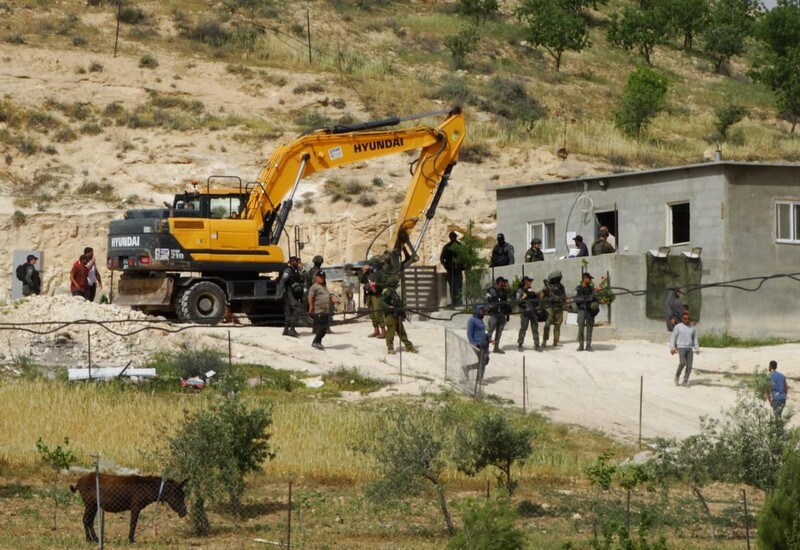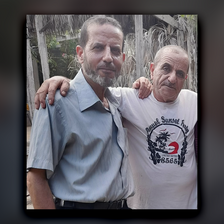The Electronic Intifada 5 May 2025

Israeli troops attack a family’s home in the occupied West Bank village of al-Tuwaini. (International Solidarity Movement)
On the morning of 22 April, the Israeli military invaded the West Bank village of al-Tuwani with the express goal of demolishing a Palestinian home.
Just before 10 am, daily activities were abruptly interrupted by the jarring sound of a convoy of heavy machinery, armored vehicles and Israeli Border Police loudly rolling into the area.
The militarized caravan targeted a small hillside home that was resting gently above the community’s school.
Dozens of Israeli soldiers armed with assault rifles, truncheons and tear gas canisters rapidly began “securing” the perimeter by forcibly removing the family.
The parents and children frantically gathered whatever possessions they could sweep up in their arms and hold tightly against their chests. They were being expelled – violently – from their home.
As the family was scrambling away in a state of distress, soldiers – with guns tightly gripped and trigger fingers primed – marched upon local organizers, human rights defenders and confused children so the demolition order could be “safely” executed without either interruption or recourse.
Once the Israeli soldiers, whose faces remained obscured by helmets and balaclavas, cordoned off the area, the bulldozer lurched forward. The pneumatic punch tore through the sheet metal roof with screeching ease while the machine’s mechanical arm smashed each wall of the home with clinical indifference.
For many, the sound was as visceral as it was sickening. Within a matter of minutes, a family’s entire home had been methodically obliterated and reduced to a dust-laden pile of concrete rubble, contorted tin and frayed wire.
Both international volunteers and community members recorded the demolition from a nearby hill.
Afterwards, a Palestinian activist asserted, “This is why we say the Nakba never ended,” referring to the mass expulsion of Palestinians by Zionist forces between 1947 and 1949.
“Our resistance hasn’t either, for the record,” the activist added.
Intimidation and impunity
For the Israeli troops overseeing “the procedure,” laying waste to the home, hopes and dreams of a Palestinian family appeared to be nothing other than the day’s task at hand. A managerial directive and job to be done – with impunity – in the service of expanding Israel’s settlements with a view to annexation.
While the home was being razed, grief-stricken family members and rightfully indignant villagers confronted the soldiers verbally. Palestinian women took the lead on rebuking the army, pointing directly at soldiers and refusing to yield in the face of intimidation.
Some held up phones to record, others shouted in pain and rage at the damage and trauma unfolding before them.
Against a backdrop of debris and wreckage, a small child from the family embraced his mother.
“This is life under occupation; they destroy whatever they want,” a local protester explained after the house was leveled.
The Israeli soldiers and Border Police remained unmoved – some even smirking wryly and laughing derisively. Shortly after, both Palestinian locals and international sympathizers were physically accosted, tear gassed and threatened with arrest by Israeli officers.
As cement particles and cries of dissent filled the air, a cistern and reservoir – crucial for Palestinian communities living in an arid region and denied access to Israel’s illegal water grid – were subsequently crushed and buried by a bulldozer.
“They go after the water because they know it’s a good way to push us off the land,” a resident from the area said.
If one thing was certain about the events I witnessed that morning, it is that the callous machinations of Israel’s apartheid regime and colonial occupation of the West Bank do not unfold solely under the cover of darkness.
Violence is put on full display in broad daylight, brazenly, to send a message.
Ceaseless settler colonial violence
The demolition in al-Tuwani is not an aberration. It’s part of a wider system of settler colonial domination in which Palestinian dwellings and infrastructure – if not lives – are deemed unlawful and expendable by Israeli officials to justify their destruction and elimination.
Across the occupied West Bank, evictions serve a parallel purpose: to uproot and expel Palestinians from spaces that Israel has targeted for settlement.
Land claims, water rights and Israeli national legislation are weaponized to fracture communities, seize territory, criminalize resistance and erase Palestinian existence.
For example, both “farming outposts” and “firing zones” – terms sanitized in official discourse – function as tools of dispossession and forced displacement.
Farming outposts enable settlers to steal land under the guise of agricultural entrepreneurship. Firing zones, equally, prohibit Palestinian presence altogether under the auspices of military training.
Similarly, Israeli administrative detention, an inhuman bureaucratic protocol that involves holding people captive without a trial and effectively without a time limit – as well as for not having committed any offense in the first place – provides legal cover for expulsion, arrest and incarceration to ensure “national security.”
Currently, nearly 10,000 Palestinians languish in Israeli prisons, many held without charge under administrative detention. Torture, abuse, humiliation and solitary confinement have been reported as routine.
Experts have argued for decades this is further undeniable evidence of racist brutality and apartheid.
Raids and attacks
Notably, the escalation in al-Tuwani came amid a wave of settler and military aggression across the West Bank.
Two days later, in the northern town of Bardala, armed settlers raided the village, killed livestock, set fields ablaze and attacked civilians. The Israeli military blocked fire trucks from reaching the flames and delayed ambulances carrying the wounded.
Days before the demolition in al-Tuwani, in the nearby village of al-Rakeez, settlers encroached on farmland by installing iron stakes among local olive trees. When a Palestinian shepherd and his teenage son confronted them, a trespassing settler shot the father in the leg.
Israeli soldiers who arrived on the scene prevented first aid and arrested the shepherd’s son, first blindfolding and then holding him in detention for several days.
The father’s leg was amputated the following day and he was kept in hospital for another few days, handcuffed to a bed.
Around the same time, belligerence directed at Palestinians was escalating in the West Bank’s cities.
In Hebron, Israeli soldiers paraded through streets, fired tear gas and arrested a child.
In Jerusalem, settlers stormed al-Aqsa mosque during Passover to perform rituals while being shielded by Israeli police officers and soldiers. Muslim worshippers were barred from entry for two days, an antagonism to assert Israeli control over the holy site.
To exist is to resist
While the genocide in Gaza rages on, so too does the generations-long war against Palestinian life in the West Bank.
Palestinians continue to be subjected to ruthless terror and “price tag attacks” that are designed to make their lives unbearable.
The home demolitions, wanton shootings, arbitrary arrests, settler hostilities, arson attacks, land grabs and religious incursions owed to the Zionist movement’s longstanding colonial onslaught all are working in concert toward a single aim: a never-ending Nakba.
Even so, in al-Tuwani and al-Rakeez, families gathered around the rubble of the demolished home to offer refuge and care for the displaced family and injured shepherd. Farmers and pastoralists in Bardala are returning to replant crops and tend to what remains of their herds.
Likewise, Palestinian youth and worshippers throughout Hebron and Jerusalem continue to stand their ground amid assaults from Israeli soldiers and settlers in the streets and at sacred sites – threats of detention and death be damned.
In the face of extermination, “to exist is to resist,” is how one longtime Palestinian solidarity advocate from the region put it.
And after having borne witness to Israeli apartheid and the rampant settler colonial eradication campaign that continues to rip apart the occupied West Bank, it is undeniable that Palestinian resistance will endure.
The author, who comes from the English city of Liverpool, is a volunteer with the International Solidarity Movement and has been engaged in direct action and the documentation of human rights violations throughout the occupied West Bank.





